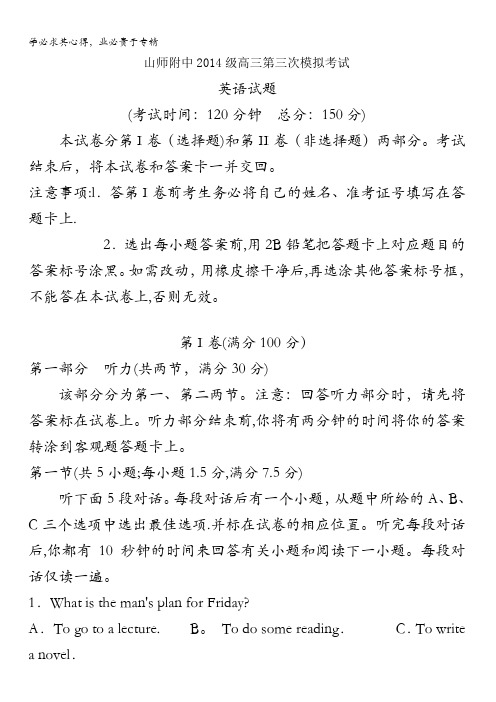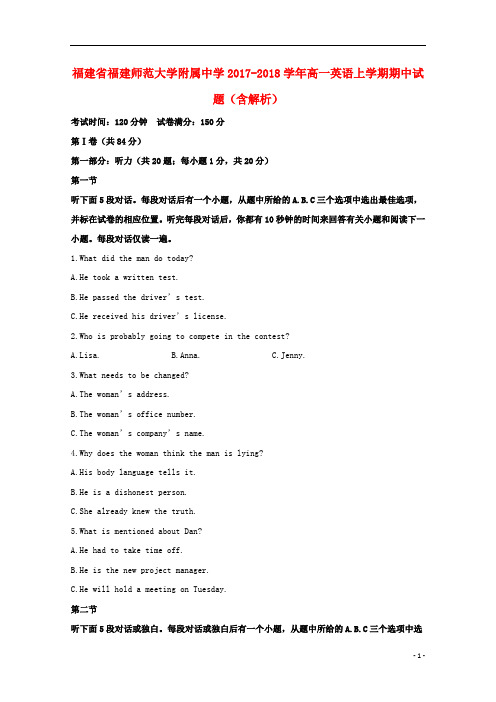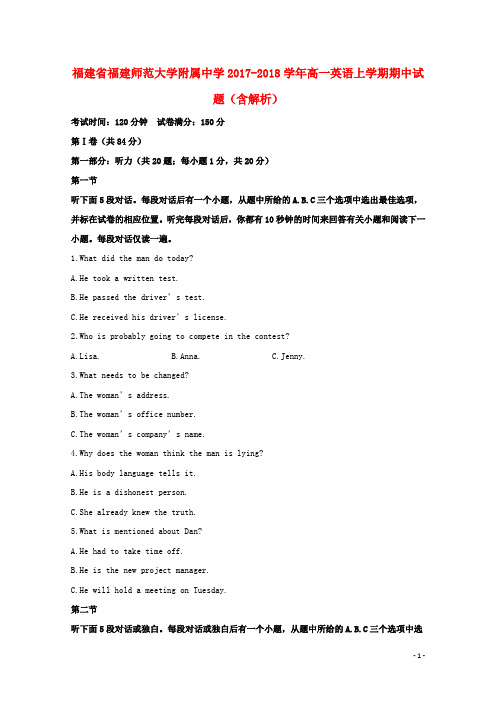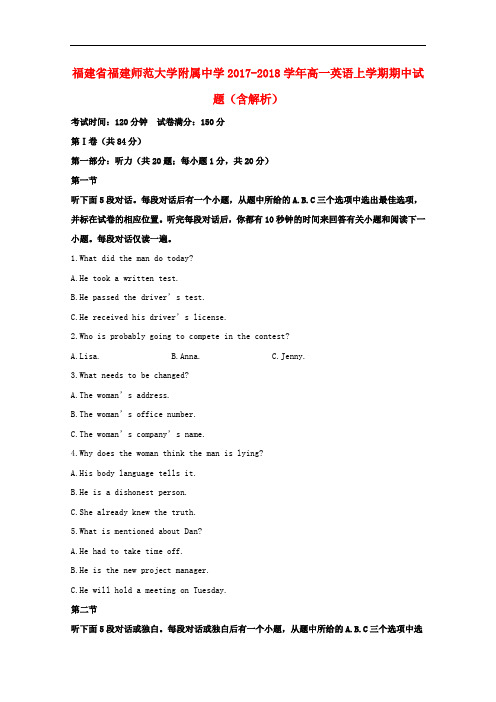福建省师大附中2017届高三上学期期中考试英语试题(有答案)(精选)
师范大学附属中学2017届高三上学期第三次模拟考试英语试卷 含答案

山师附中2014级高三第三次模拟考试英语试题(考试时间:120分钟总分:150分)本试卷分第I卷(选择题)和第II卷(非选择题)两部分。
考试结束后,将本试卷和答案卡一并交回。
注意事项:l.答第I卷前考生务必将自己的姓名、准考证号填写在答题卡上.2.选出每小题答案前,用2B铅笔把答题卡上对应题目的答案标号涂黑。
如需改动,用橡皮擦干净后,再选涂其他答案标号框,不能答在本试卷上,否则无效。
第I卷(满分100分)第一部分听力(共两节,满分30分)该部分分为第一、第二两节。
注意:回答听力部分时,请先将答案标在试卷上。
听力部分结束前,你将有两分钟的时间将你的答案转涂到客观题答题卡上。
第一节(共5小题;每小题1.5分,满分7.5分)听下面5段对话。
每段对话后有一个小题,从题中所给的A、B、C三个选项中选出最佳选项.并标在试卷的相应位置。
听完每段对话后,你都有10秒钟的时间来回答有关小题和阅读下一小题。
每段对话仅读一遍。
1.What is the man's plan for Friday?A.To go to a lecture. B。
To do some reading.C.To write a novel.2.Why has the man bought two warm coats?A。
To get a discount.B。
To give one to the woman. C.To prepare for a cold winter.3. How should the woman go to the museum?A.In the man’s car.B.By subway. C. In Henry's car。
4.What does the report show?A. The Europe department is disappointing.B。
Mr Brown believes the wrong person.C。
福建省师大附中2017届高三上学期期中考试英语试题(有答案)

福建师大附中2017学年第一学期期中测试高三英语本试卷分第I卷(选择题)和第II卷(非选择题)两部分。
满分150分,考试时间120分钟。
第I卷注意事项1. 答第I卷前,考生务必将自己的姓名、考生号填写在答题卡上。
2. 选出每小题答案后,用铅笔把答题卡上对应题目的答案标号涂黑。
如需改动,用橡皮擦干净后,再选涂其他答案标号。
不能答在本试卷上,否则无效。
第一部分听力(共两节,满分30分)第一节(共5小题;每小题1.5分,满分7.5分)听下面5段对话。
每段对话后有一个小题,从题中所给的A、B、C三个选项中选出最佳选项,并标在试卷的相应位置。
听完每段对话后,你都有10称钟的时间回答有关小题和阅读下一小题。
每段对话仅读一遍。
1. What will the man probably do about the restaurant?A. Write a good review.B. Come bac tomorrow.C. Try another place net time.2. Who does the woman thin is the best composer?A. Stravinsy.B. Holst.C. Moart.3. What is the man probably doing?A. Checing the woman’s body temperature.B. Painting the wall quicly.C. Cleaning the woman’s teeth.4. What does the woman want?A. To be the winner.B. To sing a song.C. To have another chance.5. What are the speaers taling about?A. Weather.B. A picture.C. A competition.第二节(共15小题;每小题1.5分,满分22.5分)听下面5段对话或独白。
福建省师大附中高三上学期期中考试英语试题

福建师大附中2013届高三上学期期中考试英 语 试 题(完卷时间:120分钟;满分:150分)第Ⅰ卷 (共115分)(请将你的选项,按序号填涂在答题卷上。
)第一部分:听力(共20题;每小题1.5分,满分30分)做题时,先将答案标在试卷上。
录音内容结束后,你将有两分钟的时间将试卷上的答案转涂到答题卡上。
第一节(共5小题;每小题1分,满分5分)听下面5段对话。
每段对话后有一个小题,从题中所给的A 、B 、C 三个选项中选出最佳选项,并标在试卷的相应位置。
听完每段对话后,你都有10秒钟的时间来回答有关小题和阅读下一小题。
每段对话仅读一遍。
1. What is the man doing?A. Buying furniture.B. Applying for a university.C. Looking for an apartment.2. When did the woman’s grandfather graduate from the University of Michigan?A. In 1925.B. In 1950.C. In 1975.3. Why is the girl’s father special?A. He makes time for himself.B. He balances his job and his family.C. He has a demanding job.4. Where does the conversation probably take place?A. In a restaurant.B. At the man’s house.C. In a hotel.5. What are the speakers mainly talking about?A. A theatre.B. A movie.C. A date.第二节(共15小题;每小题1分,满分15分)听下面五段对话或独白。
福建省师大附中2017-2018学年高二上学期期中考试英语试题Word版含答案.pdf

福建师大附中2017-2018学年上学期期中模块考试高二(实验班)英语试题(满分:150分时间:120分钟)最新试卷十年寒窗苦,踏上高考路,心态放平和,信心要十足,面对考试卷,下笔如有神,短信送祝福,愿你能高中,马到功自成,金榜定题名。
第Ⅰ卷(共79分)第一部分:听力(共20题;每小题1分, 满分20分)第一节(共5小题;每小题1分, 满分5分)听下面10段对话。
每段对话后有一个小题,从题中所给的A、B、C三个选项中选出最佳选项,并标在试卷的相应位置。
听完每段对话后,你都有10秒的时间来回答有关小题和阅读下一小题。
每段对话仅读一遍。
1. Where does the conversation take place?A. In a library.B. In a classroom.C. In a bookstore.2. Why does the man think the woman is lucky?A. She has finished her term paper.B. She can work on the computer.C. She has a new typewriter.3. What will the man do for the woman?A. Send her to the hospitalB. Help her ask for leave.C. Get some medicine for her.4. What do we know about the man?A. He didn’t follow his doctor’s advice.B. He was under pressure from his wife.C. He gave up smoking.5. What is the conversation about?A. How to get to Greece.B. Where to go on holiday.C. Whether to go to the small village.第二节听下面5段对话。
福建省福建师范大学附属中学2017_2018学年高一英语上学期期中试题(含解析)

福建省福建师范大学附属中学2017-2018学年高一英语上学期期中试题(含解析)考试时间:120分钟试卷满分:150分第Ⅰ卷(共84分)第一部分:听力(共20题;每小题1分,共20分)第一节听下面5段对话。
每段对话后有一个小题,从题中所给的A.B.C三个选项中选出最佳选项,并标在试卷的相应位置。
听完每段对话后,你都有10秒钟的时间来回答有关小题和阅读下一小题。
每段对话仅读一遍。
1.What did the man do today?A.He took a written test.B.He passed the driver’s test.C.He received his driver’s license.2.Who is probably going to compete in the contest?A.Lisa.B.Anna.C.Jenny.3.What needs to be changed?A.The woman’s address.B.The woman’s office number.C.The woman’s company’s name.4.Why does the woman think the man is lying?A.His body language tells it.B.He is a dishonest person.C.She already knew the truth.5.What is mentioned about Dan?A.He had to take time off.B.He is the new project manager.C.He will hold a meeting on Tuesday.第二节听下面5段对话或独白。
每段对话或独白后有一个小题,从题中所给的A.B.C三个选项中选出最佳选项,并标在试卷的相应位置。
听完每段对话或独白前,你将有时间阅读各个小题,每小题5秒钟;听完后,各小题给出5秒钟的作答时间。
福建师大附中2016-2017学年高一英语上学期期中试题

福建师大附中2016-2017学年第一学期期中模块测试高一英语 (实验班)(完卷时间:120分钟;满分:150分)第Ⅰ卷 (共74分)第一部分:听力(共20题;每小题1分,满分20分)第一节(共5 小题;每小题1分, 满分5分)听下面5段对话。
每段对话后有一个小题, 从题中所给的A、B、C三个选项中选出最佳选项, 并标在试卷的相应位置。
听完每段对话后, 你都有10秒钟的时间来回答有关小题和阅读下一小题。
每段对话仅读一遍。
1. What does the woman want to do now?A. Watch the TV programme.B. Have something to eat.C. Buy a TV set.2. Where is Mr. Johnson now?A. In the classroom.B. In the reading room.C. In the computer room.3. What will the woman do tonight?A. Go to a party.B. Write a report.C. Do her housework.4. Why can’t the woman sleep?A. She hears terrible noise.B. She often receives strange calls.C. She has to work late in a restaurant.5. What are the speakers mainly talking about?A. An explorer.B. An actor.C. A writer.第二节听下面5段对话。
每段对话后有几个小题,从题中所给的A、B、C三个选项中选出最佳选项,并标在试卷的相应位置。
听每段对话前,你将有时间阅读各个小题,每小题5秒钟;听完后,各小题将给出5秒钟的作答时间。
福建省福建师范大学附属中学2017-2018学年高一英语上学期期中试题(含解析)

福建省福建师范大学附属中学2017-2018学年高一英语上学期期中试题(含解析)考试时间:120分钟试卷满分:150分第Ⅰ卷(共84分)第一部分:听力(共20题;每小题1分,共20分)第一节听下面5段对话。
每段对话后有一个小题,从题中所给的A.B.C三个选项中选出最佳选项,并标在试卷的相应位置。
听完每段对话后,你都有10秒钟的时间来回答有关小题和阅读下一小题。
每段对话仅读一遍。
1.What did the man do today?A.He took a written test.B.H e passed the driver’s test.C.He received his driver’s license.2.Who is probably going to compete in the contest?A.Lisa.B.Anna.C.Jenny.3.What needs to be changed?A.The woman’s address.B.The woman’s office number.C.The woman’s company’s name.4.Why does the woman think the man is lying?A.His body language tells it.B.He is a dishonest person.C.She already knew the truth.5.What is mentioned about Dan?A.He had to take time off.B.He is the new project manager.C.He will hold a meeting on Tuesday.第二节听下面5段对话或独白。
每段对话或独白后有一个小题,从题中所给的A.B.C三个选项中选出最佳选项,并标在试卷的相应位置。
听完每段对话或独白前,你将有时间阅读各个小题,每小题5秒钟;听完后,各小题给出5秒钟的作答时间。
【推荐下载】福建省师大附中高三英语期中试题

[键入文字]福建省师大附中高三英语期中试题I. 听力(共两节,满分30分) (共5小题;每小题1.5分,满分7.5分) 听下面5段对话。
每段对话后有一个小题,从题中所给的A、B、C三个选项中选出最佳选项,并标在试卷的相应位置。
听完每段对话后,你都有10秒钟时间来回答有关小题和阅读下一小题。
每段对话仅读一遍。
1.When will the woman leave? A. At eight. B. At nine. C. At ten. 2.What do we know about the woman? A. She is very busy. B. She has more free time than the man. C. She will study English 4 hours a day. 3.Who will be absent from the party? A. Jessica. B. Linda. C. Rose. 4.What is the woman going to do first after she leaves home? A. Buy two chickens. B. Go to eat something. C. Go to the bank. 5.What can be concluded about the woman? A.She has got some dental(牙科的) problems. B.Her teeth have been healthy so far. C.She’s lucky to have a good dentist(牙医). 第二节(共15小题;每小题1.5分,满分22.5分)1。
福建师范大学附属中学2021-2022学年高三上学期期中考试英语试题

福建师大附中高三上学期英语学科期中考试卷时间:120分钟满分: 150分出卷人:审核人:第Ⅰ卷(共77.5分)第一部分:听力(共20题;每小题1分, 满分20分)做题时,先将答案标在试卷上。
录音内容结束后,你将有两分钟的时间将试卷上的答案转涂到答题卡上。
第一节(共5小题;每小题1分,满分5分)听下面5段对话。
每段对话后有一个小题,从题中所给的A、B、C 三个选项中选出最佳选项。
听完每段对话后,你都有10秒钟的时间来回答有关小题和阅读下一小题。
每段对话仅读一遍。
1. How much has the city’s population increased since five years ago?A. 1.5%.B. 15%.C. 50%.2. Why is the man so upset?A. He lost his new glasses.B. His glasses are broken.C. The woman used his glasses.3. What is the man encouraging the woman to do?A. Recycle.B. Use less glass.C. Throw the glass away.4. What did the man do wrong?A. He was in the wrong office.B. He used a wrong Wi-Fi password.C. He connected to the wrong network.5. What is the woman looking for?A. A cap.B. A scarf.C. A watch.第二节(共15小题;每小题1分,满分15分)听下面5段对话或独白。
每段对话或独白后有几个小题,从题中所给的A、B、C三个选项中选出最佳选项。
听每段对话或独白前,你将有时间阅读各个小题,每小题5秒钟;听完后,各小题将给出5秒钟的作答时间。
福建省师大附中高三英语上学期期中试题

福建师大附中2018-2019学年第一学期期中测试高三英语(满分:150分,考试时间:120分钟)第Ⅰ卷 (共90分)第一部分听力(共两节,满分20分)第一节听下面5段对话。
每段对话后有一个小题,从题中所给的A、B、C三个选项中选出最佳选项,并标在试卷的相应位置。
听完每段对话后,你都有10 秒钟的时间来回答有关小题和阅读下一小题。
每段对话仅读一遍。
1. How is the weather now?A. Rainy.B. Snowy.C. Cloudy.2. When will the train leave?A. At 9:00 a.m.B. At 9:30 a.m.C. At 10:00 a.m.3. Where did the speakers spend their vacation?A. In the mountains.B. On the farm.C. On the beach.4. What does the woman mean?A. The conference has been canceled.B. She will ask a friend for help.C. She wants to avoid the high season.5. What are the speakers mainly talking about?A. A new employee.B. The woman’s assistant.C. A training course.第二节听下面5段对话或独白。
每段对话成独白后有几个小题,从题中所给的A、B、C个选项中选出最佳选项,并标在试卷的相应位置。
听每段对话或独白前,你将有时间读各个小题,每小题5秒钟;听完后,各小题将给出5秒钟的作答时间。
每段对语或独白读两遍。
听第6段材料,回答第6、7题。
6. What is the man’s problem?A. He missed his flight.B. He lost his baggage.C. He took a wrong flight.7. What will the man do next?A. Check the plane again.B. Change a flight.C. Fill out a form.听第7段材料,回答第8、9题。
福建省福建师范大学附属第二中学高三上学期期中考试—

福建省福建师范大学附属第二中学2017届高三上学期期中考试英语试题(满分: 150分, 完卷时间: 120分钟)第一部分:听力(共两节,满分30分)第一节(共5小题;每小题1.5分,满分7.5分)听下面5段对话。
每段对话后有一个小题,从题中所给的A、B、C三个选项中选出最佳选项,并标在试卷的相应位置。
每段对话仅读一遍。
l- When will the bar open?A. At l:00 pm.B. At l:30 pm C At 2:00 pm.2.What does the woman advise the mm to do?A. Make the pans.B. Ask for help.C. Follow the instructions.3.What are the speakers mainly talking about?A The woman’s dressB A graduation giftC The man’3 taste.4.What is the woman?A.A secretaryB. A saleswoman C An official.5.What do the drivers strike forA. Lower petrol price.B. Controlled taxes.C. Shorter working hours,第二节(共15小题;每小题1 5分,满分22.5分)听下面5段对话或独白。
每段对话或独白后有几个小题,从题中所给的A、B、C三个选项中选出最佳选项,并标在试卷的相应位置。
每段对话或独白读两遍。
听第6段材料,回答第6、7题。
6 What will the man probably do?A. Join in the activity. B Set a good example. C. Learn from the elderly.7.Where may the conversation take place?A. In the nursing home.B. In the school.C. At the school gate.听第7段材料,回答第8、9题。
福建省师大附中高三上学期期中考试——英语英语

福建省师大附中2019届高三上学期期中考试英语试题(满分:150分,考试时间:120分钟)第Ⅰ卷(共90分)第一部分听力(共两节,满分20分)第一节听下面5段对话。
每段对话后有一个小题,从题中所给的A、B、C三个选项中选出最佳选项,并标在试卷的相应位置。
听完每段对话后,你都有10 秒钟的时间来回答有关小题和阅读下一小题。
每段对话仅读一遍。
1. How is the weather now?A. Rainy.B. Snowy.C. Cloudy.2. When will the train leave?A. At 9:00 a.m.B. At 9:30 a.m.C. At 10:00 a.m.3. Where did the speakers spend their vacation?A. In the mountains.B. On the farm.C. On the beach.4. What does the woman mean?A. The conference has been canceled.B. She will ask a friend for help.C. She wants to avoid the high season.5. What are the speakers mainly talking about?A. A new employee.B. The woman’s assistant.C. A training course.第二节听下面5段对话或独白。
每段对话成独白后有几个小题,从题中所给的A、B、C个选项中选出最佳选项,并标在试卷的相应位置。
听每段对话或独白前,你将有时间读各个小题,每小题5秒钟;听完后,各小题将给出5秒钟的作答时间。
每段对语或独白读两遍。
听第6段材料,回答第6、7题。
6. What is the man’s problem?A. He missed his flight.B. He lost his baggage.C. He took a wrong flight.7. What will the man do next?A. Check the plane again.B. Change a flight.C. Fill out a form.听第7段材料,回答第8、9题。
-福建省师大附中高三英语第一学期期中考试卷

2007—2008学年第一学期福建省师大附中高三期中考试英语试题(时间: 120分钟满分: 150分)第I卷(共115分)I. 听力 : (共两节)(满分30分,每小题1.5分)第一节(共5小题;每小题1.5分,满分7.5分)听下面5段对话。
每段对话后有一个小题,从题中所给的A、B、C三个选项中选出最佳选项,并标在试卷的相应位置。
听完每段对话后,你都有10秒钟时间来回答有关小题和阅读下一小题。
每段对话只读一遍。
1. What time will the train arrive in Wuhan?A. 5 p.m.B. 7 p.m.C. 10p.m.2. What is the relationship between the speakers?A. Boss and secretary.B. Clerk and customer.C. Father and daughter3. What can we know about the meat?A. Its price has risen.B. It’s cheaper in other shops.C. It’s as expensiveas fish.4. What did the woman buy for her husband for Christmas?A. A book.B. A recorder.C. A watch.5. What does the man mean?A. The woman must complete paperwork.B. The woman’s application (申请) is lost.C. The woman isn’t suitable for the joB.第二节(共15小题;每小题1.5分,满分22.5分)听下面5段对话或独白。
每段对话或独白后有几个小题,从题中所给的A、B、C三个选项中选出最佳选项,并标在试卷的相应位置。
福建省福建师范大学附属中学2017-2018学年高一英语上学期期中试题(含解析)

福建省福建师范大学附属中学2017-2018学年高一英语上学期期中试题(含解析)考试时间:120分钟试卷满分:150分第Ⅰ卷(共84分)第一部分:听力(共20题;每小题1分,共20分)第一节听下面5段对话。
每段对话后有一个小题,从题中所给的A.B.C三个选项中选出最佳选项,并标在试卷的相应位置。
听完每段对话后,你都有10秒钟的时间来回答有关小题和阅读下一小题。
每段对话仅读一遍。
1.What did the man do today?A.He took a written test.B.H e passed the driver’s test.C.He received his driver’s license.2.Who is probably going to compete in the contest?A.Lisa.B.Anna.C.Jenny.3.What needs to be changed?A.The woman’s address.B.The woman’s office number.C.The woman’s company’s name.4.Why does the woman think the man is lying?A.His body language tells it.B.He is a dishonest person.C.She already knew the truth.5.What is mentioned about Dan?A.He had to take time off.B.He is the new project manager.C.He will hold a meeting on Tuesday.第二节听下面5段对话或独白。
每段对话或独白后有一个小题,从题中所给的A.B.C三个选项中选出最佳选项,并标在试卷的相应位置。
听完每段对话或独白前,你将有时间阅读各个小题,每小题5秒钟;听完后,各小题给出5秒钟的作答时间。
福建省师大附中-度高三英语第一学期期中考试试题

福建省师大附中2007-2008学年度高三英语第一学期期中考试试题(时间:120分钟满分:150分)第I卷(共115分)I.听力:(共两节)(满分30分,每小题1.5分)第一节(共5小题;每小题1.5分,满分7.5分)听下面5段对话。
每段对话后有一个小题,从题中所给的A、B、C三个选项中选出最佳选项,并标在试卷的相应位置。
听完每段对话后,你都有10秒钟时间来回答有关小题和阅读下一小题。
每段对话只读一遍。
1.What time will the train arrive in Wuhan?A.5 p.m. B.7 p.m. C.10p.m.2.What is the relationship between the speakers?A.Boss and secretary. B.Clerk and customer. C.Father and daughter3.What can we know about the meat?A.Its price has risen.B.It’s cheaper in other shops.C.It’s as expensive as fish.4.What did the woman buy for her husband for Christmas?A.A book. B.A recorder. C.A watch.5.What does the man mean?A.The woman must complete paperwork.B.The woman’s application (申请) is lost.C.The woman isn’t suitable for the joB.第二节(共15小题;每小题1.5分,满分22.5分)听下面5段对话或独白。
每段对话或独白后有几个小题,从题中所给的A、B、C三个选项中选出最佳选项,并标在试卷的相应位置。
- 1、下载文档前请自行甄别文档内容的完整性,平台不提供额外的编辑、内容补充、找答案等附加服务。
- 2、"仅部分预览"的文档,不可在线预览部分如存在完整性等问题,可反馈申请退款(可完整预览的文档不适用该条件!)。
- 3、如文档侵犯您的权益,请联系客服反馈,我们会尽快为您处理(人工客服工作时间:9:00-18:30)。
福建师大附中2017学年第一学期期中测试高三英语本试卷分第I卷(选择题)和第II卷(非选择题)两部分。
满分150分,考试时间120分钟。
第I卷注意事项1. 答第I卷前,考生务必将自己的姓名、考生号填写在答题卡上。
2. 选出每小题答案后,用铅笔把答题卡上对应题目的答案标号涂黑。
如需改动,用橡皮擦干净后,再选涂其他答案标号。
不能答在本试卷上,否则无效。
第一部分听力(共两节,满分30分)第一节(共5小题;每小题1.5分,满分7.5分)听下面5段对话。
每段对话后有一个小题,从题中所给的A、B、C三个选项中选出最佳选项,并标在试卷的相应位置。
听完每段对话后,你都有10称钟的时间回答有关小题和阅读下一小题。
每段对话仅读一遍。
1. What will the man probably do about the restaurant?A. Write a good review.B. Come bac tomorrow.C. Try another place net time.2. Who does the woman thin is the best composer?A. Stravinsy.B. Holst.C. Moart.3. What is the man probably doing?A. Checing the woman’s body temperature.B. Painting the wall quicly.C. Cleaning the woman’s teeth.4. What does the woman want?A. To be the winner.B. To sing a song.C. To have another chance.5. What are the speaers taling about?A. Weather.B. A picture.C. A competition.第二节(共15小题;每小题1.5分,满分22.5分)听下面5段对话或独白。
每段对话或独白后有几个小题,从题中所给的A、B、C三个选项中选出最佳选项,并标在试卷的相应位置。
听每段对话或独白前,你将有时间阅读各个小题,每小题5秒钟;听完后,各小题将给出5秒钟的作答时间。
每段对话或独白读两遍。
听第6 段材料,回答第6、7 题。
6. What do we now about the man?A. He is not a wine driner.B. He always nows what he wants.C. He will not eat his food at the restaurant.7. What does the man order?A. Stea.B. Fish.C. Mushrooms.听第7段材料,回答第8、9题。
8. Where does this conversation liely tae place?A. On the subway.B. On an airplane.C. On a city bus.9. Why is the woman embarrassed?A. She can’t help the man.B. She finds the man attractive.C. She has to as the man to put his shoes bac on.听第8段材料,回答第10至12题。
10. Where is the man from?A. Nebrasa.B. Cairns.C. Sydney.11. What is the man’s attitude toward surfing?A. Bored.B. Ecited.C. Worried.12. What will the man do net?A. Surf the big waves.B. Surf near the beach.C. Get his sun cream.听第9段材料,回答第13至16题。
13. Who does the man see at first?A. His favorite basetball player.B. A famous actress.C. A well-nown singer.14. What does the woman give the man?A. A red shirt.B. A blac pen.C. A white hat.15. Where are the speaers?A. In a theater.B. In a shopping store.C. In a restaurant.16. What does the woman as the man to do?A. Act quicly.B. Wait until net time.C. Get her a new purse.听第10段材料,回答第17至20题。
17. How long has Herman lived in New Yor City?A. Only recently.B. His entire life.C. Since he was eight years old.18. According to the man, how many tai drivers are there?A. Hundreds.B. Thousands.C. Millions.19. What does the man say about the subway?A. It’s really fast.B. It goes everywhere.C. It isn’t very convenient on weeends.20. Why does the woman suggest visiting other cities?A. To compare them with New Yor.B. To meet some nice people.C. To appreciate New Yor more.第二部分阅读理解(共两节,满分40分)第一节(共15小题;每小题2分,满分30分)阅读下列短文,从每题所给的四个选项(A、B、C、和D)中,选出最佳选项,并在答题卡上将该项涂黑。
AFor most seventh graders, life doesn't get much harder than a history test. But for Grant Reed ofBellville, Ohio, it's his own current events that are so painful. “Honestly, I don't want to die,”Grant says. Last year, doctors at Nationwide Children's Hospital in Columbus found a tumor (肿瘤) in Grant's brain. They cut it out, but the surgery left him with stroe-lie symptoms. Plus, he had to go through months of radiation and chemotherapy to try to stop the spread of the disease.Yet, through it all, Grant has shown remarable determination, which he owes, partly, to Ohio State football. His parents, Troy and Denise, were both in the OSU marching band and fell in love during halftime of the Michigan game. His cat is named after the team Buceye. His wardrobe is painted scarlet (the color of the team's sportswear). The point is, almost nothing mattered more to Grant than Ohio State football--until he got sic, of course.“I didn't lie the word cancer,”Grant says. So he decided not to use the word. Instead, the id named his cancer Michigan and insisted everyone in his life refer to it as such, because Ohio State always beats Michigan. That was something he could understand and mae it into a competition. He was going to beat this disease.It's now been more than a year since Grant issued that announcement. “And if you loo at his scans," Dr. Randal at Nationwide Children's says, “There's nothing there. There's a big space, but there's no tumor.”“Grant is beating Michigan. And although much of it has to go to science, don't ignore the semantics(语义学). You have to do something to mae it a disease you can fight. And for Grant, that was naming it Michigan,”his parents say.This weeend, Ohio State and Michigan will be battling lie their lives depend on it. But in this house, the Reed family will be watching with a calm insight it's just a game.21. What's the main idea of the first paragraph?A. History is a difficult subject.B. Grant suffered a serious disease.C. The operation was successful.D. The tumor has spread all over.22. From the second paragraph, we can infer that _________.A. Grant was born a football fanB. football maes a full manC. interest is the best teacherD. God helps those who help themselves23. By saying that it's just a game, we can infer that the Reed family_________.A. has lost interest in the match between Ohio State and MichiganB. believes Michigan will surely beat Ohio State this weeendC. has a better understanding of lifeD. views the match as a matter of life and deathBGlobal Positioning Systems are now a part of everyday driving in many countries. These satellite-based systems provide turn-by-turn directions to help people get to where they want to go. But, they can also cause a lot of problems, send you to the wrong place or leave you completely lost. Many times, the driver is to blame. Sometimes a GPS error is responsible. Most often, say Barry Brown, it is a combination of the two.We spoe to Mr. Brown by Sype. He told us about an incident involving a friend who had flown to an airport in the eastern United States. There he borrowed a GPS-equipped car to use during his stay. Barry Brown “And they just plugged in an address and then set off to their destination. And, then it wasn’t until they were driving for thirty minutes that they realied they actually put in a destination bac on the West Coast where they lived. They actually put their home address in. So again, the GPS is ind of ‘garbage in garbage out’.”Mr. Brown says this is a common human error. But, he says, what maes the problem worse has something to do with some of the shortcomings, or failures, of GPS equipment. Barry Brown “One problem with a lot of the GPS units is that they have a very small screen and they just tell you the net turn. Because they just give you the net turn, sometimes that means that it is not really giving you the overview that you would need to now that it is going to the wrong place.”Barry Brown formerly served as a professor with the University of California, San Diego. While there, he wored on a project with Eric Laurier from the University of Edinburgh. The two men studied the effects of GPS devices on driving by placing cameras in people’s cars. They wrote a paper based on their research. It is called “The Normal, Natural Troubles of Driving with GPS.”It lists several areas where GPS systems can cause confusion for drivers. These include maps that are outdated, incorrect or difficult to understand. They also include timing issues related to when GPS commands are given.Barry Brown says, “to mae GPS systems better we need a better understanding of how drivers, passengers and GPS systems wor together.”24. In Para. 2, Mr. Brown mentioned his friend in the conversation to ________.A. laugh at his stupid friendB. describe an eample of human errorC. build up his own reputationD. prove the GPS system is only garbage25. Which of the following statement would Barry Brown be most liely to agree with?A. GPS units are to blame for the most GPS service failure.B. We should introduce higher standard for the driving licenseC. Cameras are urgently needed to help improve GPS systems.D. Some shortcomings of GPS equipment are more liely to result in service failure.26. According to Barry and Eric, which of the following is NOT among the areas of GPS systems that mayconfuse drivers?A. Wrong mapsB. Out-dated mapsC. Difficult instructionsD. Timing of GPS commands.27. What would be the best title for the tet?A. Driving Confusions Can Be Caused By Small ScreenB. Driving with GPS Can Be DifficultC. Driving without GPS Should Be Much More ConvenientD. GPS Equipment In Driving To Be Deserted Or NotCNo woman can be too rich or too thin. This saying often attributed to(由…引起) the late Duchess (公爵夫人) of Windsor represents much of the strange spirit of our times. Being thin is assumed as such a virtue.The problem with such a view is that some people actually attempt to live by it. I myself have fantasies of slipping into narrow designer clothes. Consequently, I have been on a diet for the better --or worse-- part of my life. Being rich wouldn't be bad either, but that won’t happen unless an unnown relative dies suddenly in some distant land, leaving me millions of dollars.Where did we go off the trac? When did eating butter become a sin(罪恶), and a little bit of etra flesh unappealing, if not unpleasant? All religions have certain days when people stop from eating and overeating is one of Christianity's seven deadly sins. However, until quite recently, most people had a problem getting enough to eat. In some religious groups, wealth was a symbol of probable high morals, and fatness a sign ofwealth and well-being.Today the opposite is true. We have shifted to thinness as our new mar of virtue. The result is that being fat -- or even only somewhat overweight -- is bad because it implies a lac of moral strength.Our obsession(迷恋)with thinness is also fueled by health concerns. It is true that in this country we have more overweight people than ever before, and that in many cases, being overweight correlates with an increased ris of heart and blood vessel disease. These diseases, however, may have as much to do with our way of life and our high-fat diets as with ecess weight. And the associated ris of cancer in the digestive system may be more of a dietary problem -- too much fat and a lac of fiber -- than a weight problem.The real concern, then, is not that we weigh too much, but that we neither eercise enough nor eat well. Eercise is necessary for strong bones and both heart and lung health. A balanced diet without a lot of fat can also help the body avoid many diseases. We should surely stop paying so much attention to weight. Simply being thin is not enough. It is actually dangerous if those who get (or already are) thin thin they are automatically healthy and thus free from paying attention to their overall life-style. Thinness can be pure vain(虚荣)glory.28. In the eyes of the author, an odd phenomenon nowadays is that_________.A. looing slim is a symbol of having a large fortuneB. being thin is viewed as a much desired qualityC. the Duchess of Windsor is regarded as a woman of virtueD. religious people are not necessarily virtuous29. Swept by the current trend, the author_________.A. could still prevent herself from going off the tracB. had to go on a diet for the greater part of her lifeC. had to see help from rich distant relativesD. had to wear highly fashionable clothes30. In human history, people's views on body weight_________.A. were closely related to their religious beliefsB. varied between the poor and the richC. led to different moral standardsD. changed from time to time31. What's the author's advice to women who are absorbed in the idea of thinness?A. They should rid themselves of fantasies about designer clothes.B. They should be more watchful for fatal diseases.C. They should gain weight to loo healthy.D. They should be more concerned with their overall life style.DThe wallet is heading for etinction. As a day-to-day essential, it will die off with the generation who read print newspapers. The ind of shopping, where you hand over notes and count out change in return, now happens only in the most minor of our retailers (零售商), lie buying a bar of chocolate or a pint of mil from a corner shop. At the shops where you spend any real money, that money is increasingly abstracted. And this is more and more true, the higher up the scale you go. At the most cutting-edge (前沿的) retail stores, Victoria Becham on Dover Street, for instance, you don’t go and stand at any ind of cash register when you decide to pay. The staff are equipped with iPads to tae your payment while you rela on a sofa.Across society, the abstraction of the idea of cash maes me uneasy. Maybe I’m just old-fashioned. But earning money isn’t quic or easy for most of us. Isn’t it a bit weird(怪异) that spending it should happen in half a blin (眨眼) of an eye? Doesn’t a wallet, that time-honored Friday-night feeling of pleasing, promising fatness, represent something that matters?But I’ll leave the economics to the eperts. What bothers me about the death of the wallet is the change it represents in our physical environment. Everything about the loo and feel of a wallet, the way the materials wear and tear and loosen with age, the plastic and paper and gold and silver, and handwritten phone numbers and printed cinema ticets, is the very opposite of what our world is becoming. The opposite of a wallet is a smart phone or an iPad. The rounded edges, cool glass, smooth and unnowable as a pebble (鹅卵石). Instead of digging through pieces of paper, we move our fingers left and right. No more counting out coins. Show your wallet, if you still have one. It may not be here much longer.32. What is happening to the wallet?A. It is disappearing.B. It is becoming costly.C. It is being fattened.D. It is changing in style.33. How are businesses done in big modern stores?A. Electronically.B. In the abstract.C. Individually.D. Via a cash register.34. What maes the author feel uncomfortable nowadays?A. Saving money is becoming a thing of the past.B. The pleasing Friday-night feeling is fading.C. Spending money is so fast and easy.D. Earning money is getting more difficult.35. What can we infer from the passage about the author?A. He is resistant to social changes.B. He is against technological progress.C. He wants to say good-bye to the traditional wallet.D. He feels insecure in the ever-changing modern world.第二节(共5小题,每小题2分,满分10分)根据短文内容,从短文后的选项中选出能填入空白处的最佳选项,选项中有两项为多余选项。
